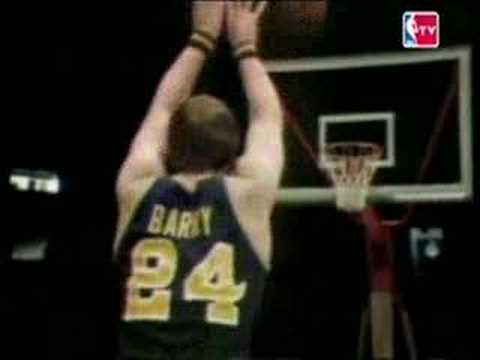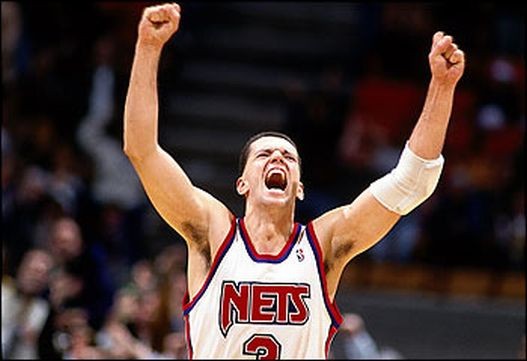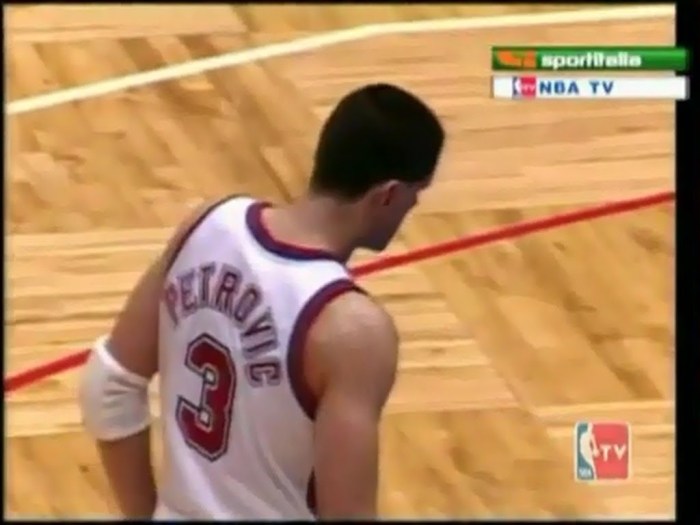Rick Barry was one of the game’s best pure SFs of all-time – a man who possessed deadly accuracy from all over the court, had court vision, could rebound, played defense tenaciously and had a will to win that is often nonexistent in today’s athletes.
He’s also, and perhaps most notably, known as one of the game’s biggest jerks. From Tony Kornheiser’s brilliant 1983 profile of Barry in Sports Illustrated:
“You’ll never find a bunch of players sitting around talking about the good old days with Rick,” says Ken Macker, the Warriors’ executive vice-president. “His teammates and his opponents generally and thoroughly detested him.” And while that seems an extreme judgment, influenced by Macker’s loyalty to his boss, Franklin Mieuli, even Barry’s defenders concede its essential truth. John Roche, a friend and teammate of Barry’s on the Nets, says, “Many players resented Rick. The way Rick conducted himself could be construed as implying superiority. But I always felt it was unintentional. People misread Rick. Most people admire competitiveness. But apparently Rick’s took forms that angered people.” Another friend, the Spurs’ Billy Paultz, who played with Barry on the Nets and the Rockets, says, “If you got to know Rick you’d have realized what a good guy he was. But around the league they thought of him as the most arrogant guy ever. I couldn’t believe it. Half the players disliked Rick. The other half hated him.”
 While a select few have found nearly every selection of NAS’ Top 44 Nets of all-time to be controversial, I’m certain the placement of Barry so low on the list is sure to ruffle a few feathers. And why not? How many players who are in their respective “best of an era” conversations have ever suited up for the Nets? Two? Three? Barry was a player with potential who actually reached it, unlike a number of other Nets who are certain to appear later on this list. But also keep in mind that Barry only spent two seasons with the Nets during their ABA iteration in New York. He was beyond outstanding, averaging more than 30 points, 7 rebounds and 4.5 assists during those two seasons, and putting the Nets organization on the map where it would inevitably achieve future glory in the ABA with Julius Erving in tow.
While a select few have found nearly every selection of NAS’ Top 44 Nets of all-time to be controversial, I’m certain the placement of Barry so low on the list is sure to ruffle a few feathers. And why not? How many players who are in their respective “best of an era” conversations have ever suited up for the Nets? Two? Three? Barry was a player with potential who actually reached it, unlike a number of other Nets who are certain to appear later on this list. But also keep in mind that Barry only spent two seasons with the Nets during their ABA iteration in New York. He was beyond outstanding, averaging more than 30 points, 7 rebounds and 4.5 assists during those two seasons, and putting the Nets organization on the map where it would inevitably achieve future glory in the ABA with Julius Erving in tow.
So perhaps it’s Barry’s personality that may be influencing his placement among all-time Nets. It’s essentially impossible to find any people that talk about how he made all of his teammates better a la a Jason Kidd, or how much he emotionally meant to his team and the game like Drazen Petrovic, or how he mentored the younger players on his team like a Vince Carter. You have this gem also from the Kornheiser piece, but we already know how GOOD Barry is at basketball:
“He was Larry Bird before there was a Larry Bird,” says Al Menendez, director of player personnel for the New Jersey Nets. “He was a great artist. A Mozart. A Picasso. A Caruso,” says Lou Carnesecca, who coached Barry for two seasons on the Nets. “I’d diagram a play, and Rick would instinctively see four or five options that I’d never even imagined. In 35 years of coaching I’ve never had another guy like that.”
Adding to the tarnishing of his legend is how he bounced around the NBA and ABA during the 1970s. He jumped from the San Francisco Warriors to the ABA’s Oakland Oaks during the 1967 story, and after a stint in Washington/Virginia, was with the Nets through 1972, helping the Nets reach the ABA Finals that year to boot. But then, a U.S. District Court judge ruled that Barry was prohibited from playing anywhere but with the NBA’s Golden State Warriors and he had to be returned to his original NBA team once his contract with the Nets expired.
“If I had to do it all over again,” Barry says, first with a grin and then a grimace, “I’d wait for some other fool to do it. It did me more harm than good. It was bad enough that people didn’t like the way I looked on the court, but when I went to the ABA I was cast as a money-hungry backstabber. So people who already didn’t like me could really tee off on me; I was fair game. Had I stayed in the NBA, I’d have overcome most of it. Eventually they’d have talked more about my playing than my histrionics. But when I left, boy, I was a marked man.”
Admittedly, my knowledge of Barry is reserved to articles like this, and NBA history clip shows. His underhanded free throw technique is as unique yet effective as it gets, and for someone who never saw him play, may be the most recognizable thing about his game I can point to.
But I understand there are going to be older fans who view Barry as so much more than perhaps this list gives him credit for. But that’s the funny thing about lists. There as subjective as it gets. Just like Barry’s game apparently was. Sure he was an all-time great, but if there’s hardly anyone out there to go to bat for you, what good is once-in-a-lifetime talent?



















